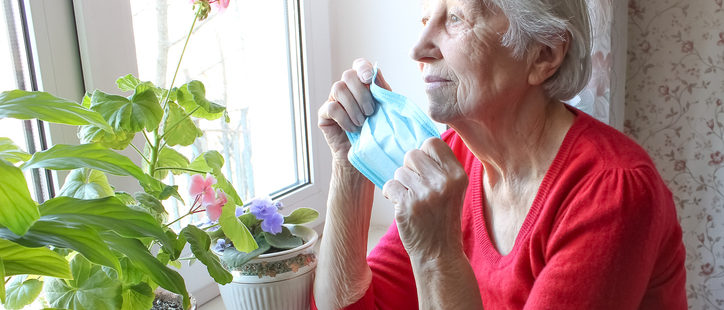Earlier this week we brought together over 80 organisations to talk about working with people at higher risk of loneliness as lockdown conditions ease. Our conversation focused on those who have been shielding, or who face wider practical, physical or psychological barriers to reconnecting. In this blog, we reflect on the themes that emerged from the discussion.
Worries about loneliness
Over 90% of the participants at our webinar were concerned about loneliness among people who have been shielding. Over 70% were concerned that some of the people they work with may never reconnect. Many expressed real worries that the incredible community response to loneliness during lockdown may not be sustained as most of us return to work and “normal” life.
However, there was also a strong sense that we have a critical window now to support people to reconnect, and to address barriers to connection exposed, or exacerbated, by lockdown. Many organisations are supporting people to restart gentle physical activity, for example, or encouraging them to develop their digital skills, as well as continuing with befriending and other loneliness services.
Psychological impacts
A key theme in our discussions was the psychological impact of lockdown. As set out in the Campaign’s recent report, the Psychology of Loneliness, long-term loneliness has deep impacts on our wider thoughts and feelings and can set off a downward spiral that is hard to escape.
Participants reported increasing levels of mental distress among people they support. Organisations recognised the strain that working with people who are anxious and hopeless can place on volunteers. Training for befrienders around the psychological impacts of loneliness is, therefore, a priority.
“There was a strong sense that we have a critical window now to support people to reconnect, and to address barriers to connection exposed, or exacerbated, by lockdown.”
We heard about significant numbers of people who were still fearful of leaving their homes. Many people who have been shielding are anxious about re-entering a world where so much has changed, and where the need to maintain social distance is challenging because others are becoming more relaxed. While schemes such as the “Give me space” badge scheme may be of some help, others will need more direct support as food and medicine delivery services have already been withdrawn in some areas.
Managing risk
Many organisations are keen to support people in resuming in-person connection. Popular options include socially-distanced walks, accompanied trips to the shops, and small group meet-ups outside.
However, restarting face-to-face support has left organisations managing complex calculations around risk, often with little guidance to support them.
“The need to communicate complex new rules makes it harder for people to feel confident about being involved.”
Organisations running community venues described significant issues in working out when, and how, to safely re-open, and in communicating new procedures to their clients.
It was recognised that many, particularly people with dementia, those who had been very isolated, and those who do not speak English as a first language, struggled to understand the “new normal” arrangements. And the need to communicate complex new rules makes it harder for people to feel confident about being involved.
Doing more… with less
Most of the organisations attending our webinar have seen huge increases in demand and had extended and adapted services in response – commonly using a combination of postal, telephone and virtual support.
While initially the focus for many had been on providing practical support with food and medicine, most were also helping with meaningful activity and connection.
In the next phase, organisations expect to continue newly established remote services, for those who are not yet ready to come out, alongside re-starting in-person provision.
However, face-to-face approaches have often had to be delivered in more resource-intensive ways – transporting smaller groups in larger vehicles, for example, or replacing large group activities with groups of two or three.
The overall sense was that in the next phase, organisations will be providing a wider range of support to many more people, in the context of dramatically reduced resources.
Coping with uncertainty
Uncertainty about the rules and about the true risks of the virus are affecting individuals’ mental wellbeing and exacerbating feelings of hopelessness around restarting connection.
These uncertainties also impacting organisations – with some participants already coping with local lockdowns, and many trying to plan for a potential second wave. The pandemic has enabled new collaborations across the voluntary and statutory sectors – but the future of these networks, as well as individual organisations, is increasingly unsure.
As the Covid-19 crisis enters its next phase, organisations working to address loneliness face an increasingly complex landscape, managing growing demand and significant risks amid considerable uncertainty.
We hope to play our part in equipping them for this challenge by enabling them to share learning and practice. However, there is clearly is a wider role for funders and Government to provide the resources, guidance and support they need.





No comments on this article yet. Please feel free to submit a comment below.
By submitting a comment you grant Campaign to End Loneliness a perpetual license to reproduce your words and name/web site in attribution. Inappropriate and irrelevant comments will be removed at an admin's discretion. Your email is used for verification purposes only, it will never be shared.